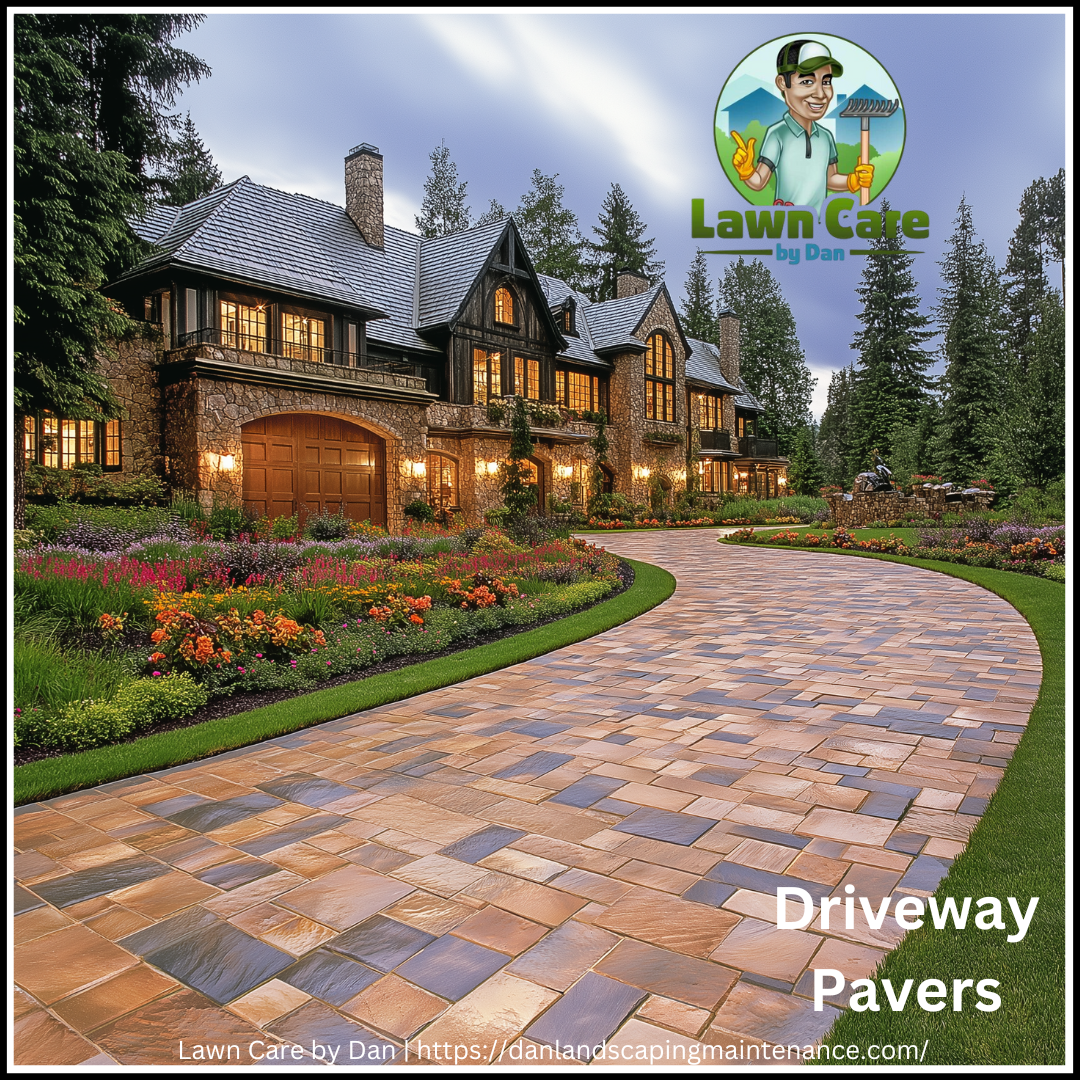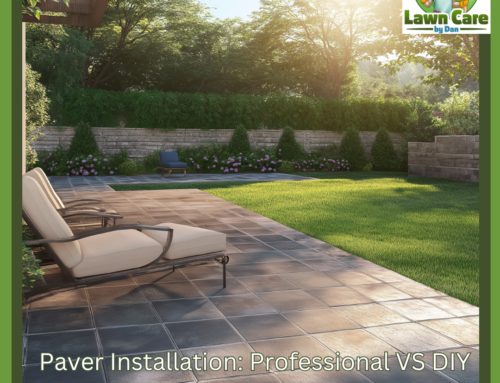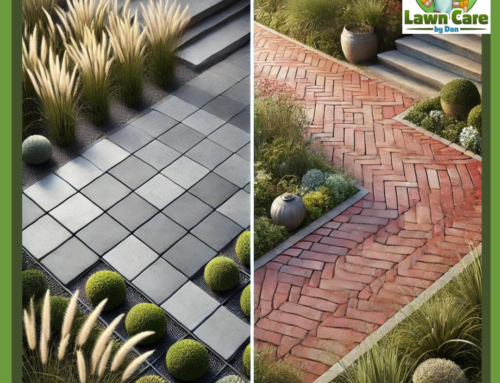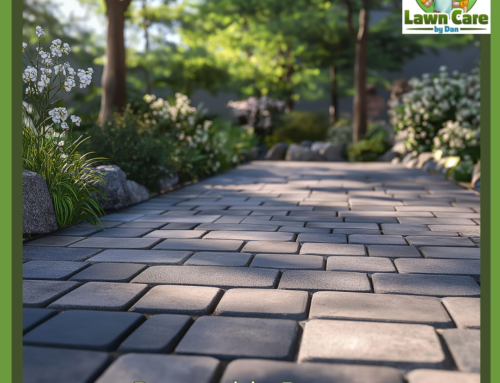7 Comprehensive Types of Driveway Pavers to Transform Your Home
Choosing the right driveway pavers can completely change the look and functionality of your property. The decision is not just about aesthetics; it involves durability, budget, and maintenance concerns. At Lawn Care By Dan, we’ve worked with a wide range of materials and helped countless homeowners find the perfect fit for their needs. In this detailed guide, we’ll dive into the most popular types of driveway pavers, highlight their pros and cons, outline costs, and even discuss installation and maintenance tips.

Concrete Pavers
Pros and Cons
Concrete pavers are known for their adaptability. They come in nearly every color and shape imaginable, making them perfect for homeowners who want to personalize their driveway’s look. Because concrete pavers are manufactured, they can be customized to complement your home’s architecture or to mimic other materials like brick or stone.
However, concrete pavers aren’t invincible. They may crack under extreme temperature fluctuations, especially if not installed correctly. Also, because they are prone to wear and tear, regular maintenance and resealing are essential to keep them looking fresh.
Pros:
- Versatility: Available in many shapes, colors, and textures, making them ideal for creative designs.
- Affordability: Comparatively cheaper than natural stone while providing a modern look.
- Ease of Replacement: If one paver gets damaged, it’s easy to replace without disturbing the rest.
Cons:
- Potential for Cracking: More susceptible to cracks from extreme weather changes and settling ground.
- Color Fading: UV rays may cause colors to fade over time, requiring periodic maintenance.
- Maintenance Needs: Requires resealing every few years to maintain color and prevent erosion.
Cost
Concrete pavers, including installation, generally cost between $8 and $15 per square foot. The cost varies depending on the design’s complexity and the pavers’ quality. Custom or high-end options can push the price higher.
Brick Pavers
Pros and Cons
Brick pavers exude an old-world charm that never goes out of style. Crafted from natural clay, they are fired at high temperatures, giving them exceptional strength. Because brick pavers retain their color well, they can look stunning for decades if properly maintained.
On the downside, brick pavers are often more brittle than other materials, making them susceptible to chipping, especially under heavy loads. Their limited color palette might be a drawback for homeowners looking for a wide range of options.
Pros:
- Classic Elegance: Timeless look that works well with traditional and colonial-style homes.
- Eco-Friendly: Made from natural clay and recyclable.
- Slip Resistance: The textured surface provides excellent grip, making it safer during rainy or icy conditions.
Cons:
- Limited Design Options: Fewer color and style options compared to concrete pavers.
- Higher Upfront Cost: Generally more expensive than concrete, especially for high-quality clay bricks.
- Brittle Nature: More prone to chipping and cracking under heavy loads or poor installation.
Cost
Brick pavers typically cost between $10 and $20 per square foot. While they are a more expensive choice, they offer long-term value thanks to their durability and aesthetic appeal.
Did you know brick pavers have been used for centuries, dating back to the roads of ancient Rome, which are still visible today?
Natural Stone Pavers
Pros and Cons
Nothing beats the natural beauty of stone pavers. Options like granite, travertine, limestone, and slate add unparalleled elegance to any driveway. Each stone has unique patterns and colors, giving your property a luxurious and sophisticated look.
However, natural stone comes at a premium cost. Beyond the price, stone pavers can be tricky to work with, as each type has specific characteristics. For instance, travertine is porous and may require sealing, while granite is incredibly tough but difficult to cut.

Pros:
- High-End Appeal: Adds luxury and significant value to your property.
- Durability: Some stones, like granite, can withstand heavy loads and harsh weather.
- Natural Variation: Unique patterns and colors make each installation one-of-a-kind.
Cons:
- Costly: High upfront investment and additional costs for specialized installation.
- Slippery When Wet: Some stones become dangerously slick in wet conditions.
- Maintenance Requirements: Porous stones need regular sealing to prevent stains and weather damage.
Cost
Natural stone pavers cost between $15 and $30 per square foot. Premium stones like marble or rare slate varieties can increase the price. However, their longevity and beauty often justify the investment.
Choosing the Right Driveway Pavers
Consider Your Home’s Style
Your home’s architectural design should heavily influence your choice of driveway pavers. Modern homes often pair well with minimalist concrete pavers, while traditional houses look best with classic brick. Rustic or Mediterranean homes may be the perfect canvas for natural stone, like travertine or limestone.
Think About Your Budget
A clear understanding of your budget will help you make a practical decision. Concrete pavers offer a stylish yet affordable option if your budget is tight. If you invest more, brick and natural stone can provide lasting beauty. Lawn Care By Dan always advises clients to consider the initial cost and the long-term maintenance expenses.
Reflect on Maintenance Needs
Maintenance is another factor that shouldn’t be overlooked. Concrete and brick pavers both require occasional sealing to keep their appearance. Natural stone might require even more care, especially in regions with harsh weather. Homeowners who prefer a low-maintenance driveway may want to steer clear of stones that need frequent attention.
Installation Process of Driveway Pavers
Preparing the Driveway
Preparation is everything when it comes to driveway paver installation. The area must be cleared of existing pavement, vegetation, and debris. Then, the ground must be leveled and compacted. A solid base layer of gravel or sand is essential to prevent shifting and ensure the longevity of your pavers.
Laying the Pavers
Pavers are laid according to a pre-determined pattern, and each unit is spaced precisely. Edge restraints, often made from plastic, metal, or concrete, are installed to keep the pavers in place. Proper leveling is crucial, as even a slight slope can lead to water pooling.
Sealing and Finishing
Sealing the pavers after installation is an optional but highly recommended step. It protects the pavers from the elements and prevents oil and rust stains. A quality sealant can also enhance the color and make cleaning easier.
The type of sand used between pavers is crucial. Polymeric sand hardens and prevents weed growth while stabilizing the pavers.
Maintaining Driveway Pavers
Regular Cleaning
Routine cleaning is necessary to keep pavers looking their best. Sweep away leaves and debris frequently to avoid stains. Use a pressure washer or mild detergent to remove grime and moss buildup for a deeper clean.
Sealing
Sealing pavers helps to maintain their color and integrity. Sealed surfaces resist oil and water stains more effectively. However, not all pavers need sealing. Natural stones with a high density, like granite, may not require it, while porous stones and concrete greatly benefit from a good sealant.
Repairing Damaged Pavers
One significant advantage of using pavers is the ease of repairs. Unlike concrete slabs, which require breaking up large sections, you can replace individual pavers. Damaged or shifted units should be reset promptly to prevent further damage.
Environmental Impact of Driveway Pavers
Permeability and Drainage
Permeable pavers have grown in popularity due to their eco-friendly design. These pavers allow water to pass through the joints, reducing stormwater runoff and helping replenish groundwater. This is especially important in urban areas where water drainage is a problem.
Heat Absorption
Driveways made from dark materials, such as asphalt or dark concrete pavers, contribute to the urban heat island effect. Natural stone or light-colored concrete can reflect more sunlight, keeping the surface cooler. Some homeowners also choose pavers with special reflective coatings.
Lifespan and Sustainability
The sustainability of driveway pavers depends on the material. Concrete pavers can be recycled but wear out faster than natural stone. Stone, while costly, is one of the most sustainable choices due to its longevity and natural origins. Choosing materials that last longer for the environmentally conscious reduces the overall environmental impact.
Final Thoughts on Driveway Pavers
Recap of Key Points
Each type of paver has its own set of benefits and drawbacks. Concrete is affordable and versatile; brick is durable and classic, and natural stone is luxurious and long-lasting. Understanding these differences is essential for making the best choice for your home.
Final Advice for Homeowners
Lawn Care By Dan encourages homeowners to take the time to research and plan. Whether you use budget-friendly concrete, traditional brick, or upscale natural stone, your driveway is a significant investment. Proper installation and regular maintenance will ensure your driveway remains a beautiful and functional part of your home for years.
FAQ for Driveway Pavers
What is the most cost-effective paver material?
Concrete pavers are usually the most budget-friendly, offering many styles and good durability for the price.
How often should I seal my driveway pavers?
It would be best to seal pavers every two to three years, depending on weather exposure and traffic levels.
Are permeable pavers a good choice for areas with heavy rainfall?
Yes, permeable pavers are ideal for rain-prone areas. They allow water to seep through, reducing runoff and improving drainage.
Choosing the right driveway pavers can seem overwhelming, but with expert guidance from Lawn Care By Dan, you’re one step closer to your dream driveway.






